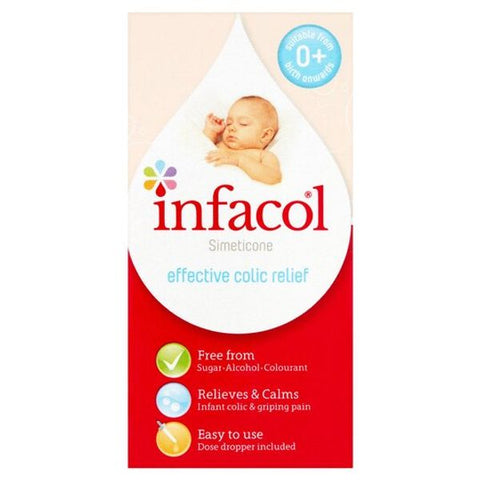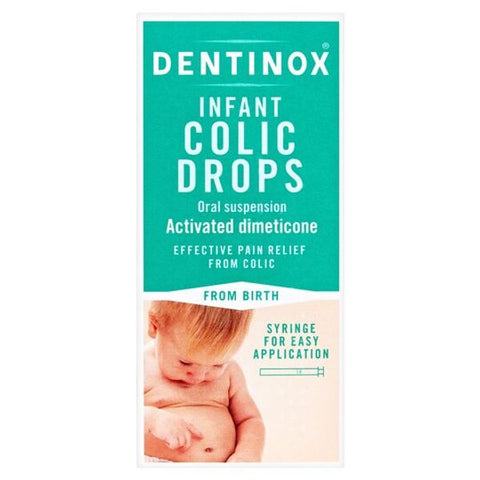Colic Drops: Parent's Guide
Welcome to Colic Drops: Parent's Guide, where we'll go through how to ease the discomfort of your little one.
Explore the causes of colic, understand the role of colic drops, and equip ourselves with practical tips to navigate through this challenging phase of parenthood with confidence and compassion.
What is Colic?
Colic is a term used to describe excessive and frequent crying in an otherwise healthy and well-fed infant. Babies with colic often cry inconsolably for extended periods, typically in the late afternoon or evening. The exact cause of colic is unknown, but it's believed to be related to gastrointestinal discomfort, immature digestive systems, or sensitivity to certain foods or environmental factors. Colic can be distressing for both babies and parents, as it can disrupt sleep patterns and create stress within the household. However, it's important to note that colic is a temporary condition that usually resolves on its own by the time the baby reaches three to four months of age.
How Does Colic Drops Help?
Colic drops, also known as gripe water or anti-colic drops, are liquid supplements specifically formulated to help alleviate the symptoms of colic in infants.
They often contain natural ingredients such as herbal extracts, ginger, fennel, or chamomile, which are believed to have soothing properties for the digestive system.
Here's how colic drops may help:
-
Relieving Digestive Discomfort: Many colic drops contain ingredients that are thought to aid digestion and alleviate gas, which can contribute to colic symptoms such as abdominal discomfort and bloating.
-
Soothing Irritated Bowels: Some herbal extracts in colic drops have mild antispasmodic properties, which may help relax the muscles of the intestines, reducing spasms and discomfort.
-
Calming Effects: Certain ingredients like chamomile or lemon balm in colic drops are known for their calming and relaxing properties, which can help soothe a fussy baby and promote better sleep.
-
Hydration: Colic drops are typically administered orally, which can help ensure that the baby stays hydrated, especially if they are reluctant to feed due to colic-related discomfort.
While colic drops may provide relief for some infants, it's essential to consult with a paediatrician before using them, especially if your baby has any underlying medical conditions or if you're unsure about the ingredients.
Other Ways To Help With Colicky Episodes
Additionally, addressing other factors such as feeding techniques, burping methods, and creating a calm environment can complement the use of colic drops in managing colic symptoms effectively.
Here are several other methods that can help alleviate colic symptoms in babies:
-
Comfort Measures: Gentle rocking, swaddling, or holding your baby in a comfortable position can provide soothing comfort and may help reduce crying episodes.
-
Feeding Techniques: Adjusting feeding techniques, such as ensuring a proper latch during breastfeeding or using paced bottle feeding, can help minimize air intake and reduce gas, which may contribute to colic.
-
Burping: Burping your baby frequently during and after feedings can help release trapped air in the stomach, reducing discomfort and colic symptoms.
-
Probiotics: Some studies suggest that probiotic supplements may help alleviate colic symptoms by promoting a healthy balance of gut bacteria. Consult with your pediatrician before giving probiotics to your baby.
-
Elimination Diet: If you're breastfeeding and suspect that certain foods in your diet may be triggering colic in your baby, you can try eliminating potential allergens such as dairy, caffeine, or spicy foods from your diet and observe if there's any improvement.
-
White Noise or Gentle Music: Playing soft white noise or soothing music in the background can create a calming environment for your baby and may help mask other noises that could trigger fussiness.
-
Warm Baths: Giving your baby a warm bath can help relax their muscles and provide relief from colic-related discomfort. Just ensure the water is comfortably warm and supervise your baby at all times.
-
Baby Massage: Gentle massage techniques, especially focusing on the baby's tummy in a clockwise motion, can help stimulate digestion, relieve gas, and promote relaxation.
-
Structured Routine: Establishing a predictable daily routine for feeding, sleeping, and playtime can help your baby feel more secure and may reduce colic symptoms by minimizing stress and anxiety.
Recommended Colic Drops
In this section, we highlight trusted brands in our online store known for their commitment to quality and their dedication to providing relief for both babies and parents alike.
Infacol Colic Relief Drops £5.75
Infacol Colic Relief Drops offer gentle relief for wind, infant colic, and griping pain in newborns and older babies. Its sugar, alcohol, and colorant-free formula is designed to assist small trapped gas bubbles in joining together, making it easier for babies to release gas and find relief from discomfort. With a convenient integrated dropper and a pleasant orange flavour, Infacol provides a reliable solution for soothing colic symptoms from birth onwards.
Dentinox Colic Drops £3.85
Dentinox Colic Drops provide soothing relief for wind and griping pains in babies from birth onwards. Its gentle, alcohol-free formulation helps disperse trapped air in the digestive system, promoting a calmer and more contented baby. The drops can be easily administered by adding them to the baby's bottle or using the included syringe for precise dosing. Trusted and reliable, Dentinox offers flexibility in dosing and is suitable for use from birth.
Colief Infant Drops £14.70
Colief Infant Drops aid in breaking down lactose in a baby's milk, making it more easily digestible and potentially reducing colic symptoms related to lactose intolerance. By assisting in lactose digestion before feeding, Colief Infant Drops offer a gentle solution for babies who may struggle with lactose in their milk.










